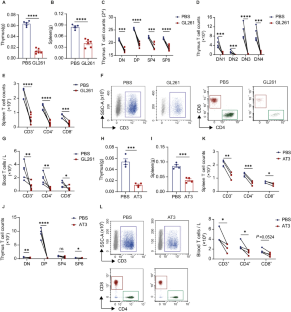Targeting the glucocorticoid receptor-CCR8 axis mediated bone marrow T cell sequestration enhances infiltration of anti-tumor T cells in intracranial cancers
IF 21.8
1区 医学
Q1 IMMUNOLOGY
引用次数: 0
Abstract
Brain tumors such as glioblastomas are resistant to immune checkpoint blockade therapy, largely due to limited T cell infiltration in the tumors. Here, we show that mice bearing intracranial tumors exhibit systemic immunosuppression and T cell sequestration in bone marrow, leading to reduced T cell infiltration in brain tumors. Elevated plasma corticosterone drives the T cell sequestration via glucocorticoid receptors in tumor-bearing mice. Immunosuppression mediated by glucocorticoid-induced T cell dynamics and the subsequent tumor growth promotion can be abrogated by adrenalectomy, the administration of glucocorticoid activation inhibitors or glucocorticoid receptor antagonists, and in mice with T cell-specific deletion of glucocorticoid receptor. CCR8 expression in T cells is increased in tumor-bearing mice in a glucocorticoid receptor-dependent manner. Additionally, chemokines CCL1 and CCL8, the ligands for CCR8, are highly expressed in bone marrow immune cells in tumor-bearing mice to recruit T cells. These findings suggested that brain tumor-induced glucocorticoid surge and CCR8 upregulation in T cells lead to T cell sequestration in bone marrow, impairing the anti-tumor immune response. Targeting the glucocorticoid receptor-CCR8 axis may offer a promising immunotherapeutic approach for the treatment of intracranial tumors.


靶向糖皮质激素受体-CCR8轴介导的骨髓T细胞螯合可增强颅内癌中抗肿瘤T细胞的浸润。
胶质母细胞瘤等脑肿瘤对免疫检查点阻断疗法具有抗药性,这主要是由于肿瘤中的 T 细胞浸润有限。在这里,我们发现颅内肿瘤小鼠表现出全身免疫抑制和骨髓中的T细胞封存,导致脑肿瘤中的T细胞浸润减少。血浆中皮质酮的升高通过糖皮质激素受体驱动肿瘤小鼠的T细胞封存。肾上腺切除术、糖皮质激素活化抑制剂或糖皮质激素受体拮抗剂以及T细胞特异性糖皮质激素受体缺失的小鼠均可减轻糖皮质激素诱导的T细胞动力学介导的免疫抑制以及随后的肿瘤生长促进作用。肿瘤小鼠 T 细胞中 CCR8 的表达以糖皮质激素受体依赖的方式增加。此外,CCR8 的配体趋化因子 CCL1 和 CCL8 在肿瘤小鼠骨髓免疫细胞中高表达,以招募 T 细胞。这些研究结果表明,脑肿瘤诱导的糖皮质激素激增和T细胞中CCR8的上调会导致T细胞在骨髓中固着,从而损害抗肿瘤免疫反应。以糖皮质激素受体-CCR8轴为靶点可能为治疗颅内肿瘤提供一种前景广阔的免疫治疗方法。
本文章由计算机程序翻译,如有差异,请以英文原文为准。
求助全文
约1分钟内获得全文
求助全文
来源期刊
CiteScore
31.20
自引率
1.20%
发文量
903
审稿时长
1 months
期刊介绍:
Cellular & Molecular Immunology, a monthly journal from the Chinese Society of Immunology and the University of Science and Technology of China, serves as a comprehensive platform covering both basic immunology research and clinical applications. The journal publishes a variety of article types, including Articles, Review Articles, Mini Reviews, and Short Communications, focusing on diverse aspects of cellular and molecular immunology.

 求助内容:
求助内容: 应助结果提醒方式:
应助结果提醒方式:


